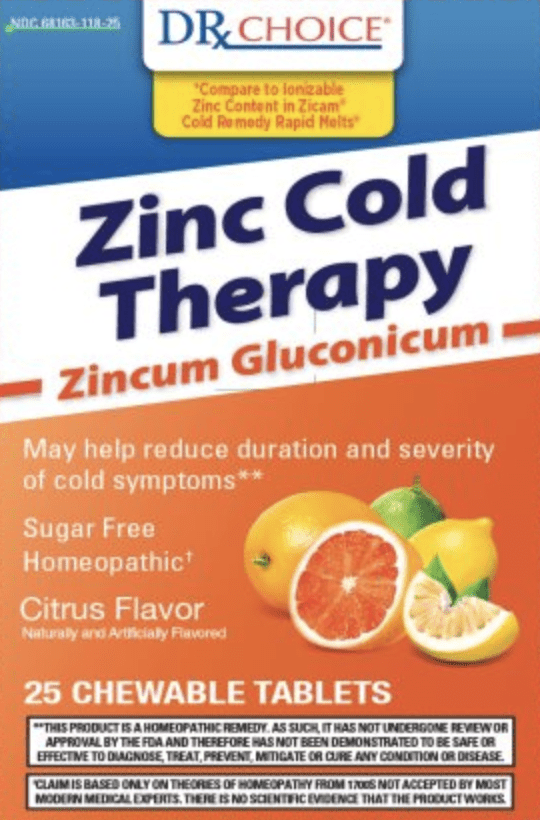Zinc gluconate
Generic name: zinc gluconate [ ZINK-GLUE-koe-nate ]
Brand names: Orazinc, Zinc Gummies
Dosage forms: oral lozenge (10 mg), oral tablet (15 mg; 30 mg; 50 mg)
Drug class: Minerals and electrolytes
What is zinc gluconate?
Zinc is a mineral that is used as a dietary supplement in people who do not get enough zinc from food.
Zinc gluconate lozenges are used to help make cold symptoms less severe or shorter in duration. This includes sore throat, cough, sneezing, stuffy nose, and a hoarse voice.
Zinc gluconate is not effective in treating flu or allergy symptoms.
Zinc gluconate may also be used for purposes not listed in this medication guide.
Zinc gluconate side effects
Get emergency medical help if you have any of these signs of an allergic reaction: hives; difficulty breathing; swelling of your face, lips, tongue, or throat.
Less serious side effects may include:
-
dry mouth, altered sense of taste; or
-
an unpleasant taste in your mouth.
This is not a complete list of side effects and others may occur. Call your doctor for medical advice about side effects. You may report side effects to FDA at 1-800-FDA-1088.
Related/similar drugs
Dextrose
Dextrose information from Drugs.com . Includes Dextrose side effects, interactions and indications.
Zinc
Zinc is used for dietary supplementation, vitamin/mineral supplementation and deficiency
Ozempic
Learn about Ozempic (semaglutide) for type 2 diabetes treatment, weight management, cardiovascular ...
Coenzyme Q10
Coenzyme Q10 is an alternative medicine used to reduce the symptoms of mitochondrial disorders ...
Pyridoxine
Pyridoxine systemic is used for anemia, dietary supplementation, drug induced vitamin/mineral ...
Calcium/vitamin d
Calcium/vitamin d systemic is used for dietary supplementation, osteoporosis
Multivitamin
Multivitamin systemic is used for dietary supplementation, hyperhomocysteinemia
Ascorbic acid
Ascorbic acid systemic is used for dietary supplementation, scurvy, urinary acidification
Acetylcysteine
Acetylcysteine systemic is used for acetaminophen overdose, diagnostic bronchograms, dietary ...
Warnings
Follow all directions on the label and package. Use exactly as directed.
Before taking this medicine
Ask a doctor or pharmacist if zinc gluconate is safe to use if you have ever had:
-
an allergy to zinc; or
-
any condition that makes it hard for your body to absorb nutrients from food (malabsorption).
Ask a doctor before using this medicine if you are pregnant or breastfeeding.
Not approved for use by anyone younger than 12 years old.
How should I take zinc gluconate?
Use exactly as directed on the label, or as prescribed by your doctor.
Take a zinc gluconate tablet with food if it upsets your stomach.
The recommended daily dose of zinc gluconate changes with age. Follow your healthcare provider's instructions. You may also consult the Office of Dietary Supplements of the NIH, or the USDA Nutrient Database of recommended daily allowances for more information.
Do not swallow a zinc gluconate lozenge whole. Allow it to dissolve in your mouth completely. Do not use more than 6 lozenges per day (or 4 per day for anyone 12 to 18 years old).
Start taking zinc lozenges as soon as possible after cold symptoms appear.
Call your doctor if your cold symptoms do not improve after 7 days.
Store at room temperature away from moisture and heat.
Throw away any lozenges not used within 6 months after opening.
Zinc gluconate dosing information
Usual Adult Dose for Dietary Supplement:
Dosage: 105 mg to 350 mg daily.
What happens if I miss a dose?
Take the medicine as soon as you can, but skip the missed dose if it is almost time for your next dose. Do not take two doses at one time.
What happens if I overdose?
Seek emergency medical attention or call the Poison Help line at 1-800-222-1222.
What should I avoid while taking zinc gluconate?
Avoid eating or drinking anything for 15 minutes after dissolving a zinc gluconate lozenge in your mouth.
What other drugs will affect zinc gluconate?
Ask a doctor or pharmacist before using zinc gluconate with any other medications, especially:
-
an antibiotic; or
This list is not complete. Other drugs may affect zinc gluconate, including prescription and over-the-counter medicines, vitamins, and herbal products. Not all possible drug interactions are listed here.
Popular FAQ
What are the best zinc-rich foods to eat?
Zinc is a natural mineral present in some foods. Examples of food rich in zinc are:
- Alaska king crab
- Meat, such as beef, lamb, and pork
- Oysters
- Pine nuts
- Pumpkin seeds
- Wheat germ.
More about zinc gluconate
- Check interactions
- Compare alternatives
- Reviews (6)
- Drug images
- Side effects
- Dosage information
- During pregnancy
- Drug class: minerals and electrolytes
- En español
Patient resources
- Zinc Gluconate Capsules and Tablets patient information
- Zinc Gluconate Extended-Release Tablets
- Zinc Gluconate Lozenges
Related treatment guides
Further information
Remember, keep this and all other medicines out of the reach of children, never share your medicines with others, and use this medication only for the indication prescribed.
Always consult your healthcare provider to ensure the information displayed on this page applies to your personal circumstances.
Copyright 1996-2025 Cerner Multum, Inc. Version: 5.01.

